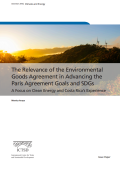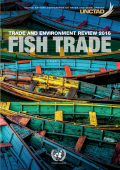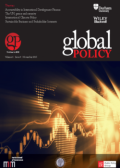
The purpose of this paper is to explore the potential role of the Environmental Goods Agreement (EGA) under the auspices of the World Trade Organization (WTO) in supporting the objectives of the Paris Agreement and the sustainable development goals of 2015, paying particular attention to potential benefits for developing countries. It analyses whether and how joining the EGA could bring benefits to developing countries that might be able to access clean energy technologies at a lower cost.

The report aims to examining and documenting the role and significance of various enabling measures that could facilitate a smooth transition to an inclusive green economy in Africa, taking into account the implications of such a transition for the region. The measures examined are: policies and institutions, policy instruments, technology development and transfer, capacity development, and financing the transition.
The report (i) Analyses the implications of the transition to an inclusive green economy for Africa; (ii) Explores measures as they relate to the transition, and analyses trends in the application of the measures; (iii) Discusses challenges and opportunities for an inclusive green economy transition in Africa; and (iv) Puts forward policy recommendations that could enhance the adoption of enabling measures relevant for a smooth transition in Africa.
For more than a decade, African economies have achieved impressive and sustained growth. In 2014, growth rates averaged 3.9 per cent – only East and South Asia grew faster, at 5.0 per cent. However, this growth can be described as largely non-inclusive because of its limited contribution to job creation, broad participation and overall improvement to people’s living standards.The challenge facing Africa is not only how to maintain such rapid growth, but how to translate it into sustained and inclusive development based on economic diversification that creates jobs, contributes to reduced inequality and poverty rates, enhances access to basic services, and corrects market failures that undermine environmental sustainability. This report is to promote understanding and the adoption of inclusive green economy policies that foster sustainable structural transformation in the region.

The concept of a ‘green economy’ has risen to prominence in recent years. However, little has been said about what actors could drive its widespread adoption at the global level. At present, global governance generally occurs in distinct policy domains or ‘silos’; the global environment and the global economy are segregated. Within these domains, authority is highly fragmented among numerous institutions. However, two particular institutions have the broad scope and potentially the capacity to coordinate and steer green economy efforts: the United Nations Environment Programme (UNEP) and the Group of Twenty (G20). This article examines why some (including UNEP itself) have called for the G20 to take a greater role in steering the green economy and assesses the extent to which it has done so. The article concludes that the G20 was ineffective in promoting a ‘green recovery’ from the Global Financial Crisis (GFC) and has similarly failed to stimulate ‘green growth’. Reform of both the G20 and UNEP could improve global policy on the green economy, but changes to the G20 would likely have a greater impact.
